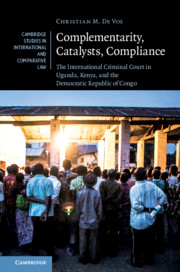 Complementarity, Catalysts, Compliance
Complementarity, Catalysts, Compliance from Part II - The ICC in Uganda, Kenya and the Democratic Republic of Congo
Published online by Cambridge University Press: 16 April 2020
This final, concluding chapter summarizes the book’s key findings and concludes that the ICC’s interventions and complementarity are better understood as axes around which advocacy for a global accountability norm has turned. Rather than a catalyst in itself, it is the court’s mediated relationship with non-state actors that has had the greatest ‘catalytic effect’ on domestic accountability efforts. In this sense, civil society organizations are both object and subject of this effect: They seek to expand complementarity’s normative influence, while having themselves been transformed by it. The chapter also offers a number of recommendations for future inquiry and practice: It urges a critical rethinking of the ICC’s politics, greater use of the Rome Statute’s cooperation and dialogue regimes (rather than admissibility) as an approach to encouraging domestic accountability, greater experimentalism, and a reorientation towards international criminal justice as a project of global legal pluralism.
To save this book to your Kindle, first ensure [email protected] is added to your Approved Personal Document E-mail List under your Personal Document Settings on the Manage Your Content and Devices page of your Amazon account. Then enter the ‘name’ part of your Kindle email address below. Find out more about saving to your Kindle.
Note you can select to save to either the @free.kindle.com or @kindle.com variations. ‘@free.kindle.com’ emails are free but can only be saved to your device when it is connected to wi-fi. ‘@kindle.com’ emails can be delivered even when you are not connected to wi-fi, but note that service fees apply.
Find out more about the Kindle Personal Document Service.
To save content items to your account, please confirm that you agree to abide by our usage policies. If this is the first time you use this feature, you will be asked to authorise Cambridge Core to connect with your account. Find out more about saving content to Dropbox.
To save content items to your account, please confirm that you agree to abide by our usage policies. If this is the first time you use this feature, you will be asked to authorise Cambridge Core to connect with your account. Find out more about saving content to Google Drive.